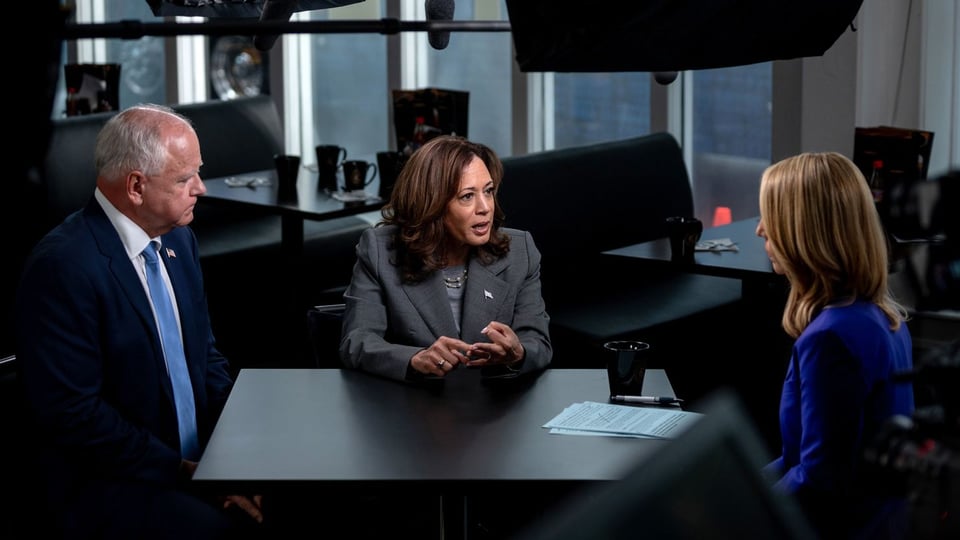November Can’t Come Soon Enough

After weeks of being pestered by her rivals, Vice President Harris finally sat down with the press for her first interview as the Democratic front-runner. Despite CNN’s attempt to hype it up, it was an absolute nothing burger. The drama over whether she would sit down at all and whether she’d do it solo or with Walz was ridiculous from the start.
CNN’s Dana Bash fired off a series of “gotcha” questions following the same formula: “In 2019, you said X about Y. Now you’re saying Z about Y. How can the American people trust you?” By the third time through this cycle, my mind started wandering. There was literally nothing new to learn here. Despite the fact that CNN got a ratings boost, apparently 6 million people tuned in to watch, it was just another reminder that our elections are way too damn long.
466 days ago, on May 24, when Florida Governor Ron DeSantis threw his hat in the ring for the presidency, it kicked off the 2024 campaign and this 15-month-long media hellscape, with two more agonizing months to go.
Who in their right mind wants this?
In Canada, campaigns are legally capped at 37 to 51 days.
The UK? Prime Minister Rishi Sunak called for elections on May 22, and by July 4—just 43 days later—he and his Tories were shown the door after 14 years.
France? On June 9, French President Emmanuel Macron announced snap elections. The first round of French elections was June 30. France uses a runoff/two round system, where the winning candidate must get a majority of the vote, rather than a simple plurality. So, a second round of voting was held on July 7.
This means France had a whole campaign and two rounds of voting in 28 days.
Oh, those are parliamentary systems, you say? What about presidential systems?
Look at Mexico: On September 6, 2023, the Mexican left-leaning ruling party, National Regeneration Movement (MORENA), announced that Mayor of Mexico City and climate scientist, Claudia Sheinbaum, would be their standard bearer in the 2024 election. She was elected president on June 2—a 270 day campaign cycle—nearly half the length of ours.
When President Biden stepped aside this summer and Harris became the Democratic front-runner, I saw smart people lamenting that she only had four months to introduce herself and mount a campaign. Only four months? Are you kidding me? Four months is an eternity! You can teach a whole AP class in four months!
Our elections are like the U.S. healthcare system—accidents of policy that have created the worst systems in the world. Nobody planned it this way; it just sort of happened. And even though we all know it’s bonkers, no real change seems likely.
You might think I’m just being a crank, but these two-year long presidential races are the pits. The sitting president can barely govern because they’re too busy fundraising and campaigning. Meanwhile, hundreds of thousands of organizers and volunteers are laboring in swing states trying to win an election instead of engaging in issue-based organizing and advocacy.
We blow obscene amounts of money for nothing. By the end, both campaigns will have spent over a billion dollars combined, and that’s before you count the Super PAC and independent expenditure ads. It’s disheartening to watch progressives, who once championed campaign finance reform and public financing of campaigns, now celebrate how much money VP Harris has raised for her reelection—somewhere around $500 million.
And where’s that money going? To political consultants and insiders—the very folks who’ll churn out the tidal wave of negative ads we’ll be drowning in until Election Day. What societal problems will this money solve? Absolutely none. We could’ve raised funds to fight homelessness, fund school lunches, or to aid refugees in Gaza. Instead, we’re enriching the consultant class and the owners of local broadcasters like Sinclair Broadcasting Group (some of the worst people in politics, by the way).
These marathon campaigns create all the wrong incentives. People tune in late, handing power to the activists who get involved early. We end up making decisions in low-turnout primaries that lock us into poor choices for the General Election in November.
Instead of holding early caucuses and primaries in the dead of winter, why not push them to later in the year when turnout could be higher, and the weather isn’t miserable? In today’s polarized environment, there are hardly any swing voters left. Most people are deciding whether to vote at all, not who to vote for.
There’s a reason no one else does it like this.
But here’s the kicker: I know I’m powerless to change any of this. The election machine grinds on, and no amount of ranting will slow it down. Yet, here I am, yelling into the void because this endless political circus is driving me crazy. And you know what? We’ll be right back here in mid-2026, doing this all over again.